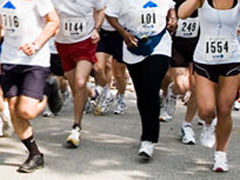Risk of Death During Marathons Lower than Commonly Believed
A new study out of Sunnybrook Health Sciences Centre has found that the risk of dying while running a marathon is remarkably low, contrary to popular misconceptions, and that marathons actually reduce fatalities on the roads.
“Our findings indicate that the risk of sudden cardiac death while running a marathon is much lower than previous estimates based on small studies provoked by single events,” says the lead researcher Dr. Donald Redelmeier. “In addition, for every cardiac death blamed on the marathon, about two motor-vehicle deaths are prevented due to the road closures.”
The study, ‘Competing risks of mortality with marathons: A community perspective’, examined marathons in the United States from 1975 to 2004, reflecting over 10 million hours of vigorous exercise. Eligible races each had at least 1,000 participants and two decades of history. The study also examined how many motor vehicle crash deaths did and did not occur because roadways were closed for the marathon.
Of the 3,292,368 runners studied, a total of 26 sudden cardiac deaths were observed, equivalent to a rate of 0.8 per 100,000 participants. In contrast, 46 total crash deaths were averted during marathon days when the roadways were closed to vehicular traffic. The net reduction in sudden death during marathons amounted to about 1.8 crash deaths saved for each case of sudden cardiac death observed, and was not due to re-routing of traffic elsewhere.
“Fatalities that result from physical exercise, like those during marathons, are widely publicized and can have a negative effect on attitudes toward exercise,” says Dr. Redelmeier. “The deaths attract great community interest, and may cause people to disregard more frequent causes of death - motor vehicle collisions. The risks from exercise are much smaller than typical roadway activity and smaller than the risk of a serious crash with driving for 26 miles.”
The study also notes that not every mile carries the same risk of sudden cardiac death. Less than 5 per cent of cardiac deaths occur in the first half of the marathon whereas about 50 per cent of cardiac deaths occur in the final mile. “Knowing this statistic,” says Dr. Redelmeier, “emergency crews need to prioritize the resuscitation equipment near the finish line, spectators need to give them space to do their work, and runners need to be careful with the final sprint.”
Support for the study was provided by The Canada Research Chair in Medical Decision Sciences.
PDF / View full media release »


